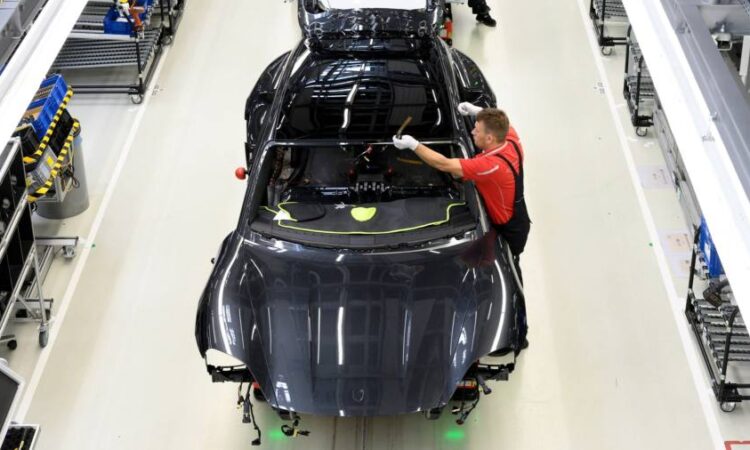
Everyone wants a slice of the electric vehicle market. Carmaking is not only a big employer, it has also long symbolised a nation’s manufacturing prowess, from British Minis to Italian Ferraris. As the sector goes electric to meet climate change targets, the US, EU and China have been thrust into a race to build up domestic EV production capabilities. In the frenzy of subsidies and deals, electric automakers need to decide how best to locate their complex supply chains.
Last week, global carmaker Stellantis — which owns brands like Vauxhall, Peugeot and Citroën — warned UK lawmakers that it may have to close one of its electric van factories. It fears that production will soon cease to be competitive. From 2024, as part of the post-Brexit trading agreement, EVs traded between the UK and EU will need to have 45 per cent of their parts sourced from either region, or face 10 per cent tariffs. British and European carmakers say they are not ready, and worry about being displaced in each other’s market.
While the so-called “rules of origin” regulations were clear when the Brexit deal was struck, carmakers claim Russia’s invasion of Ukraine and supply chain upheaval since have altered cost dynamics. Battery factories on both sides of the channel are also being set up later than expected when the rules were set. The rule itself acts as an important stick to both auto- and policymakers to invest in building a thriving domestic EV ecosystem. But if manufacturers feel this is not in place, the rules also risk denting the sector just as the US Inflation Reduction Act and China are luring them away. It could even mean EVs traded between the UK and Europe face tariffs, while petrol vehicles would not, keeping EVs more expensive for longer. That would not be ideal for the green agenda.
At this stage an extension of the 2024 deadline, as firms are calling for, may make sense. But carmakers and governments must not use it as an excuse to delay action further. Indeed, the UK — which is further behind Europe in the EV space — must recognise that the tariffs are just one element of the large effort needed to build a competitive EV system.
Batteries, which face local content rules too, comprise a significant share of EVs’ total cost. But the UK has only a handful of battery gigafactories in its prospective pipeline, compared with Europe’s 30. Attempts to woo battery makers from Asia and nurture homegrown ones have fallen flat — Britishvolt collapsed in January. Batteries also need critical minerals and refining processes in place. The US and EU are throwing money at this. The UK is trailing, right across the supply chain, even before factoring in broader issues like its high energy and logistics costs.
Developing a thriving EV and battery industry requires long-term and joined-up thinking across sectors. To date that is lacking in the UK. The government shuns the notion of an industrial strategy altogether, and recent political upheaval has not helped. It has been left chasing standalone deals and lobbying Brussels — an ineffectual approach compared to the billions being promised in the US and Europe. For electric automakers, Britain is not looking like a serious long-term bet.
In the end, hoping the European Commission delays the regulations is not a strategy, for either UK or European carmakers. The EU may have an incentive to postpone tougher requirements, being further ahead of the UK in the sector. But, equally, it could judge that with the damage likely to be greater on the UK than its own car industry, given the UK’s greater reliance on auto exports to the bloc, keeping it in place could help draw business across the Channel. Either way, the global battle for EVs is shaping up to be cut-throat and those that lack a strategic approach will be left behind.






